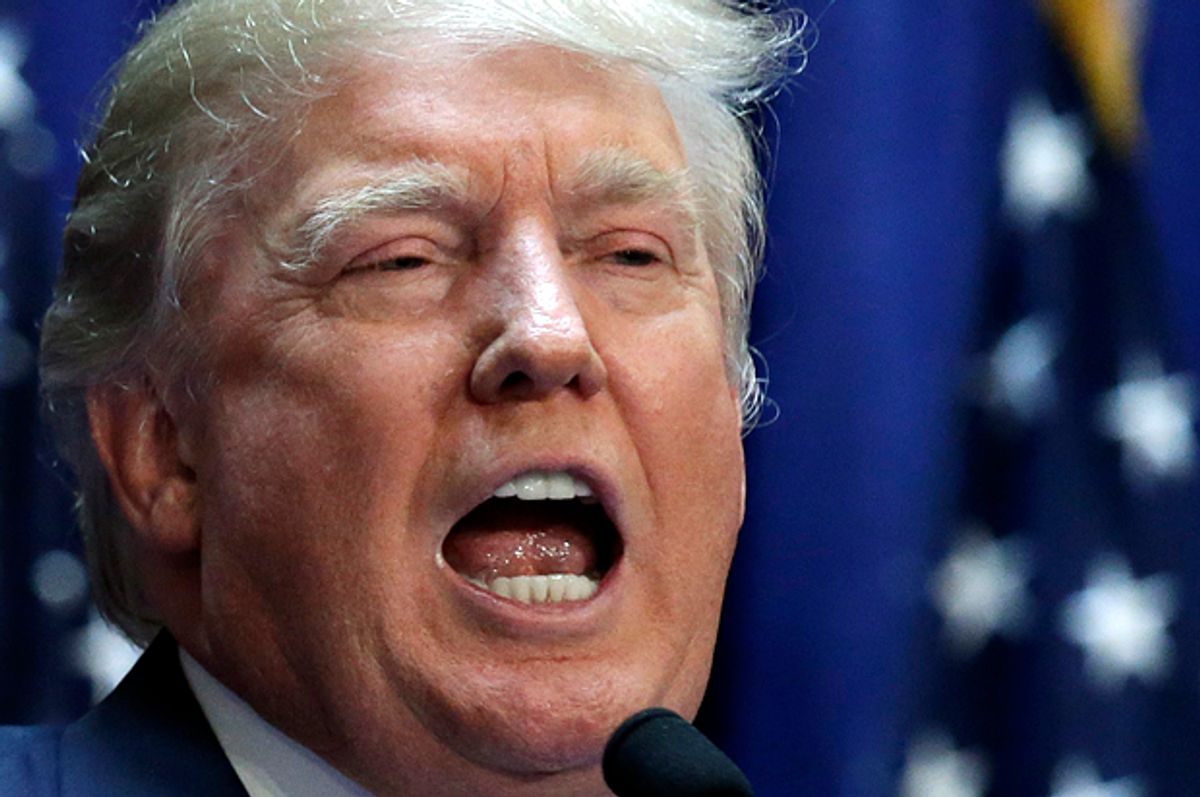 Hillary Clinton’s campaign may not develop the sizzle the would-be first Madam President and her team have long planned for. But the race has already created its first, truly searing image in the skin of the American nation.
Hillary Clinton’s campaign may not develop the sizzle the would-be first Madam President and her team have long planned for. But the race has already created its first, truly searing image in the skin of the American nation.
To the Democratic Party establishment’s great relief, this is not the result of any of Hillary Clinton’s missteps, of which there have been some.
Rather, the problem emerged from the inside of the tent of the Republican Party. It is commonly called the “Donald Trump problem.”
The worst part for the Republicans is that Trump has the same effect as a Trojan horse. (Beware of the “Greeks” bearing gifts, Republicans of the United States!)
Trump’s emergence in the polls in Iowa and New Hampshire gives the Democrats a secret weapon to frame the race – and the entire Republican field — well before a Republican nominee emerges.
Trump’s troublesome personality characteristics and policies are essentially also true of nearly all the other Republican candidates, but nobody knows who they are and there are twenty of them. He jumped from 3% to 12% in CNN’s polling of Republican voters nationwide from May 31 to June 28. That puts him within striking distance of Jeb Bush, whose campaign is floundering.
Donald Trump’s net worth
It would be one thing if Trump’s downer effect were only that he embodies ostentatious – even offensive – wealth, far more so than Mitt Romney, the party’s 2012 candidate, ever did. Romney came to symbolize the 1% class with “just” $250 million. Forbes values the flamboyant Trump at a minimum of $4.1 billion.
That also means that Trump outperforms the previous wealthiest candidate ever to seek the U.S. presidency — Ross Perot – by a factor of two. (Perot ran in 1992 as an independent against President George H.W. Bush and then-Governor Bill Clinton.)
So, he paints Republicans firmly into the corner of the money worshippers (which inoculates Hillary Clinton against similar charges).
But an ocean of money is not Trump’s only similarity to Mr. Perot. Trump represents a similar brand of nativist economic populism that is popular with a sizable chunk of American voters.
In an era where Democrats are publicly debating the economic values of their party, Trump helps divert the (rightly or wrongly) feared label of “economic populist.”
That alone would not cause Republicans a problem, were it not for the unfortunate fact that nearly all their major candidates this cycle are promoting similarly ridiculous and nativist platforms on economics, immigration and beyond.
Hillary’s man in the Republicans camp
Where Trump does Hillary’s (and the Democrats’) bidding is that he is a very loud magnet for media attention. Without the Democrats trying (and leaving fingerprints), Trump highlights how not-ready-for-primetime the rest of the Republican field is.
His outrageous views on racial minorities are doubly politically problematic: First, he profits off employing “illegal” workers at construction sites.
And second, the silence of the Republican field to stand up to Trump’s race-baiting is as deafening as it is electorally deadly.
It is a well-known fact that, in order to win the White House, Republicans must get more than 40% of the Hispanic vote. After Donald Trump spewing his mouth so loudly and so blatantly, that is a very hard target to reach.
The rest of the field is somewhat less loud or more restrained on the race-baiting issue. But there is little daylight between him and them on this topic.
All in, all the way?
Worse for Republican leaders, Trump could conceivably go the distance, if he wants to. He certainly has the ego, the financial resources as well as – from his media empire – a name-recognition probably only rivaled by the dynastic Jeb Bush.
What Trump has to contend with is that he is not particularly well liked, for all that fame. He is like an abrasive, uncontrolled Ronald Reagan. Or a villainous Arnold Schwarzenegger from New York who hates foreigners.
Outside of the 20% of voters who enthusiastically vote for Ross Perot types, people don’t love Trump. They love to hate him. They live to see his humiliation and failure, whether through his next bankruptcy (of which he has had quite a few) or in other venues.
Donald Trump may not win the nomination, but the Republicans will have a very hard time to rein him in or control him. To the Democrats’ great delight, he is setting the tone and terms of the race on the Republican side of the field.
He also helps correct the Democrats’ campaign war chest imbalance tremendously. They were very afraid of being outspent by Republicans, thanks to the U.S. Supreme Court’s Citizens United decision.
Democrats had counted on having to orchestrate huge purchases of attack ads to define the eventual Republican nominee. Mr. Trump’s anti-Hispanic shenanigans have obviated the need to do that, at least for now.
The not-so-bright future for Republicans
And while it is said that voters have a very short memory, and have not yet really focused on the 2016 decision, the memory of Trump’s attacks will be enduring for at least the next two years. It is quite unlikely that this will escape Hispanic voters’ minds.
One final thought: The creeping disintegration of Trump’s business networks in the aftermath of his entry into the race may mean that, for him, there is blood on the floor.
Getting ever madder due to the loss of very profitable television deals might induce him to stay in the race as an independent and split the conservative base. And that is precisely what Ross Perot did in the 1992 race, with known results and benefits for the “other” Clinton.



Shares